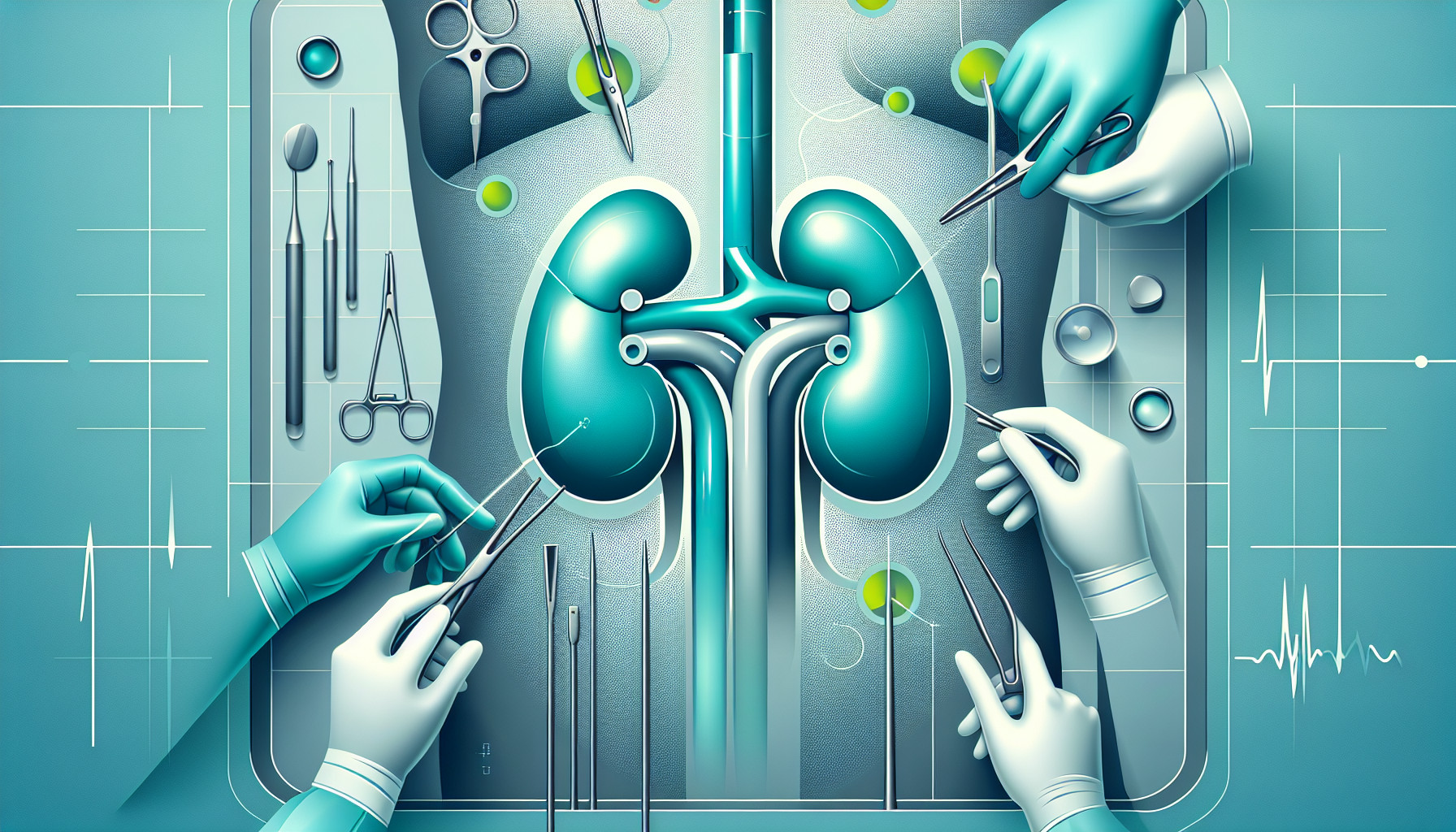Our Summary
This research paper explores different surgical methods used in dual kidney transplantation (DKT), a procedure developed to improve results from a certain type of donor. The researchers looked at 15 reports of 434 DKT recipients and found three main surgical methods being used. After comparing these methods, they found that patient survival rates were over 95% after one year, and the kidney graft survival rates were also over 90%. The rates of delayed kidney function were between 20% and 30% for all methods. The research concluded that all three surgical methods were equally effective. This is positive because it suggests that surgeons can select the method that best suits their skills and the patient’s needs.
FAQs
- What is dual kidney transplantation (DKT)?
- What were the main findings of the research on different surgical methods used in DKT?
- How do the survival rates compare between the different surgical methods used in DKT?
Doctor’s Tip
One helpful tip a doctor might tell a patient about kidney transplant is to closely follow the post-operative care instructions provided by the medical team. This includes taking prescribed medications, attending all follow-up appointments, and maintaining a healthy lifestyle to support the function of the transplanted kidney. By following these guidelines, the patient can help ensure the long-term success of the transplant.
Suitable For
Patients who are typically recommended for kidney transplant are those with end-stage renal disease (ESRD) who are no longer able to function properly with dialysis treatment. These patients may have conditions such as diabetes, hypertension, polycystic kidney disease, or autoimmune diseases that have led to kidney failure. Additionally, patients who have a decreased quality of life due to their kidney disease, such as constant fatigue, nausea, and inability to work or perform daily activities, may also be recommended for kidney transplant.
In general, candidates for kidney transplant should be in good overall health and have a life expectancy of at least five years. They should also have a strong support system in place to help them through the transplant process and post-transplant care. Additionally, candidates should be willing and able to adhere to a strict medication regimen to prevent rejection of the transplanted kidney.
It is important for patients to undergo a thorough evaluation by a transplant team to determine if they are suitable candidates for kidney transplant. This evaluation will include medical tests, psychological assessments, and discussions about the risks and benefits of transplant. Ultimately, the decision to recommend a patient for kidney transplant will depend on their individual circumstances and the likelihood of a successful outcome.
Timeline
Before kidney transplant:
- Patient is diagnosed with end-stage renal disease and is referred for evaluation for kidney transplant.
- Patient undergoes a series of medical tests and evaluations to determine if they are a suitable candidate for transplant.
- Patient is placed on a waiting list for a deceased donor kidney or begins the process of finding a living donor.
- Patient undergoes pre-transplant preparations, including education about the transplant process, medication management, and lifestyle changes.
After kidney transplant:
- Patient undergoes the transplant surgery, where the diseased kidney is removed and the new kidney is implanted.
- Patient is closely monitored in the hospital for any signs of rejection or complications.
- Patient begins taking immunosuppressant medications to prevent rejection of the new kidney.
- Patient is discharged from the hospital and continues to be monitored closely in the following weeks and months.
- Patient undergoes regular follow-up appointments and medical tests to ensure the success of the transplant.
- Patient may experience fluctuations in kidney function, medication adjustments, and potential side effects of immunosuppressants.
- Patient gradually resumes normal activities and enjoys an improved quality of life with the functioning transplanted kidney.
What to Ask Your Doctor
- What are the potential risks and complications associated with a kidney transplant?
- How long is the recovery period after a kidney transplant and what can I expect during this time?
- What is the success rate of kidney transplants and how long do transplanted kidneys typically last?
- How will I need to adjust my lifestyle and medication regimen after a kidney transplant?
- How often will I need to follow up with my transplant team and what ongoing care will be required?
- What are the criteria for selecting a kidney donor and how can I go about finding a suitable donor?
- Are there any specific dietary or exercise guidelines I should follow before and after the transplant?
- How will my existing medical conditions or medications be affected by a kidney transplant?
- Are there any alternative treatment options to consider before proceeding with a kidney transplant?
- What support services are available to help me and my family cope with the emotional and financial challenges of a kidney transplant?
Reference
Authors: Cocco A, Shahrestani S, Cocco N, Hameed A, Yuen L, Ryan B, Hawthorne W, Lam V, Pleass H. Journal: Clin Transplant. 2017 Aug;31(8). doi: 10.1111/ctr.13016. Epub 2017 Jun 23. PMID: 28544075
